Can Child Support be Modified because of a Disability?
When child support is awarded at the conclusion of a divorce or parentage case, support payments are firmly established. Child support is set based on the parent’s ability to pay and the best interests of the child(ren), with the goal of providing the same level of support (or as close to it as possible) as the child(ren) received when the parents were together. A parent cannot stop making full payments on their own; they must go back to court to seek a modification.
When the parent who is responsible for child support becomes disabled and is no longer able to work, there is a strong likelihood that they will not have the financial means to continue paying the same level of support as when they were working. Many individuals in this situation often ask, “can child support be modified because of a disability?”
The short answer to that question is “probably”, but as always, it depends on your specific circumstances. Modifications can usually be granted when there is a significant decrease in income; but you cannot assume that this will be the case, and you still need to obtain approval from the court before your child support payments can be formally modified.
Before going straight to the court, however, there are some questions you should answer and potentially some other options to look at:
What Type of Disability Payments will you be Receiving?
Since your change in income is the primary determining factor the court will look at in deciding whether or not to modify child support, one of the first questions that will be asked is how much will you be getting in disability, and follow up to that – how will your disability income compare with your current level of income?
The amount you receive in disability will be determined largely by where you are getting your benefits from. There are several potential sources of disability income:
- A Private Disability Insurance Plan: If you have disability insurance that you purchased privately, this will usually pay you somewhere between 60% and 80% of your current take home pay (after taxes). If you have good coverage that is paying more toward 80% or higher, then the court will probably not modify your child support obligations all that much.
- Disability Insurance through your Employer: If you have disability coverage at work, the benefits are usually not quite as good as the average private plan. Generally, you can expect to get about 50% of your take home pay on the low side, and upwards of 80% on the high side.
- Workers Compensation Insurance: If you suffered a qualifying work-related injury or illness, you may be eligible for workers’ comp benefits. If approved, you should receive two-thirds of your pre-tax income.
- Social Security Disability Insurance (SSDI): Social Security Disability pays benefits based on a complex formula, and it is usually significantly lower than your current income, especially if you are presently earning several thousand dollars a month or more. If you have a high income now and all you will receive for your disability is SSDI, you may have a strong argument for a child support payment modification.
- Supplemental Security Insurance (SSI): SSI is a means-tested disability program for low-income claimants. Payments are very low compared to other programs, generally only enough to cover basic living needs. If SSI is going to be your only source of income, you will probably not be able to afford much (if anything) for child support.
Can you Work Something Out with the Other Parent?
If the other parent of your child is reasonable, you might be able to negotiate an arrangement with them rather than having to argue your case in court. Explain to them that you are no longer able to work, and what the difference in income will be now that you are disabled. You may even want to offer to spend extra time caring for your child or children in exchange for a lower support payment. If you are able to agree to something, make sure to have it formalized for your protection. Speak with an experienced family law attorney to have the agreement written up and brought to the court for approval.
Can your Children Receive Dependent Benefits?
Another option you can look into is whether or not your children can qualify for dependent benefits through the Social Security Administration (SSA). This may be possible if you are receiving SSDI benefits and your children are under 18, disabled, or 19 years old and full-time college students. If you are able to get your children approved for dependent benefits, the court may subtract the amount your kids are receiving from your child support obligation.
Have Further Questions about Child Support and Disabilities? Contact a Skilled Virginia Family Law Attorney
Child support can be a contentious and emotionally charged issue, and the courts have strong enforcement mechanisms in place to ensure that parents make their payments. If you have had a significant change in circumstance since your divorce or parentage case was finalized and you want to seek a child support modification, you need a seasoned family law attorney in your corner advocating forcefully for your rights and interests. Call Olmstead & Olmstead today at 703-361-1555 to schedule a personalized consultation. You may also message us through our web contact form or visit our office in Manassas, VA at your convenience.












Leave a Reply
Want to join the discussion?Feel free to contribute!